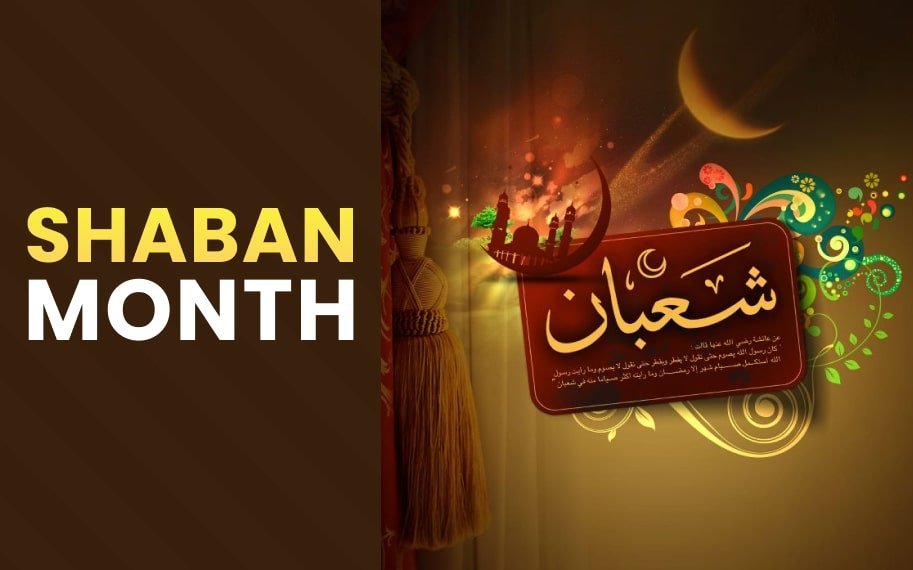
Shaban, the eighth month of the Islamic calendar, holds a unique and revered position in the hearts of Muslims. Often considered a bridge between the sacred months of Rajab and Ramadan, Shaban carries its significance, virtues, and benefits. This blog explores the spiritual dimensions of Shaban, emphasizing its virtues, the importance of fasting, and the numerous benefits it offers to those who observe it.
Table of Contents
Meaning of Shaban
The literal meaning of the word Shaban is ‘dispersion’ or ‘separation’. In the past, Arab tribes used to disperse and look out for water and oasis during this month. They did this to prepare for the heat following the month. Shaban gave hope and optimism to bear the heat that prevailed in Ramadan. In the modern world, Shaban metaphorically continues the traditions of preparations, but today, for the long fasting days of Ramadan.
Shaban 2024 dates: Shaban month 2024 will begin on the 11th of February and end on the 11th of March. The 15th of Shaban will fall on 25th March 2024.
Shaban Month Importance
The month of Shaban holds particular importance in the Islamic tradition. Here are several aspects that highlight the significance of Shaban:
- Preparation for Ramadan:
- Shaban is considered a preparatory month for Ramadan, the holiest month in the Islamic calendar. It serves as a transition period, allowing believers to spiritually gear up for the upcoming month of fasting, prayer, and increased devotion.
- Night of Barat (Lailat-ul-Baraat):
- The 15th night of Shaban is known as Lailat-ul-Baraat or the Night of Barat. Muslims believe that on this night, Allah decides the destinies of individuals for the coming year. Many engage in special prayers, seeking forgiveness for their sins, and asking for blessings, mercy, and guidance.
- Increased Voluntary Worship:
- During Shaban, Muslims are encouraged to increase their acts of voluntary worship, such as extra prayers (Nafl), recitation of the Quran, and acts of charity. This heightened devotion helps individuals strengthen their connection with Allah and cultivate good habits before the arrival of Ramadan.
- Forgiveness and Repentance:
- Shaban provides an opportunity for believers to seek forgiveness and repentance for their sins. It is a time for reflection on one’s actions, with the hope of purifying the heart and seeking Allah’s mercy.
- Following the Sunnah of Prophet Muhammad (PBUH):
- The Prophet Muhammad (PBUH) is reported to have observed fasting in Shaban, particularly in the first half of the month. Following this Sunnah is considered a virtuous practice, and some Muslims choose to fast on certain days or throughout the month.
Benefits of Fasting in Shaban
- Spiritual Cleansing: Fasting during Shaban provides an opportunity for spiritual cleansing and self-discipline. It allows Muslims to purify their hearts and minds in anticipation of the holy month of Ramadan.
- Developing Consistency: Fasting in Shaban encourages a sense of consistency in worship. By engaging in voluntary fasts, individuals cultivate a habit of regular devotion and spiritual mindfulness.
- Seeking Allah’s Mercy: The act of fasting in Shaban is a means of seeking Allah’s mercy and forgiveness. It is a proactive step towards self-improvement and a way to draw closer to Allah in the pursuit of righteousness.
Importance of 15th of Shaban
The 15th of Shaban, known as Laylat al-Baraat, is a night of forgiveness and mercy. Muslims engage in extra prayers, seek forgiveness, and some observe fasting. It is believed that Allah determines destinies for the coming year on this night. Many also pray for deceased loved ones and avoid superstitious practices associated with the occasion. While its exact significance may vary, Laylat al-Baraat is an opportunity for spiritual reflection and increased devotion.

Fasting on 15 Shaban
Fasting on the 15th of Shaban is a practice observed by many Muslims. While the exact status of fasting on this day is a matter of scholarly debate, some traditions suggest that Prophet Muhammad (PBUH) recommended fasting during this month, including the 15th day.
Here are some points regarding fasting on the 15th of Shaban:
- Many Muslims observe this fast as a means of seeking forgiveness, as it is believed that Allah forgives sins on this night.
- The fast serves as a form of spiritual preparation for the upcoming month of Ramadan, allowing believers to ease into the discipline of fasting.
- Scholarly opinions on the practice may vary, with some scholars considering the supporting hadiths as weak or disputed.
- Fasting on the 15th of Shaban is voluntary, and individuals may choose to observe it based on their understanding of the Sunnah and personal convictions.
- It is important to avoid associating superstitious beliefs with this practice and focus on sincere worship and adherence to authentic Islamic traditions.
Connection to Ramadan
Shaban serves as a bridge between Rajab and Ramadan in the Islamic calendar. It is a month of preparation, both spiritually and physically, for the arrival of Ramadan. Muslims use Shaban to increase their devotion, seek forgiveness for their sins, and engage in acts of worship to get ready for the fasting, increased prayer, and heightened spirituality that Ramadan entails. The observance of Shaban helps Muslims transition smoothly into the holiest month of Ramadan, where fasting from dawn to sunset is obligatory for adult Muslims.
Conclusion
In the tapestry of Islamic months, Shaban emerges as a radiant thread, connecting believers to the spiritual essence of their faith. Its significance, virtues, and the practice of fasting contribute to the holistic development of individuals, fostering a deepened connection with Allah. As we immerse ourselves in the blessings of Shaban, may our hearts be open to the mercy and guidance that this sacred month offers, preparing us for the spiritual journey that lies ahead in the blessed month of Ramadan.
FAQs
Q1: What is the significance of the month of Shaban in Islam?
A1: Shaban is the eighth month of the Islamic calendar and is considered significant for various reasons. It acts as a preparatory month for Ramadan, includes the Night of Barat for seeking forgiveness, and provides an opportunity for increased acts of worship.
Q2: Is fasting recommended during the month of Shaban?
A2: Yes, fasting in Shaban is recommended based on the Sunnah of Prophet Muhammad (PBUH). While it’s not obligatory, many Muslims choose to fast, especially during the first half of the month, as a form of preparation for Ramadan.
Q3: What is the Night of Barat, and why is it significant in Shaban?
A3: The Night of Barat, which falls on the 15th night of Shaban, is considered a night of forgiveness and divine blessings. Muslims engage in prayers, seek forgiveness, and request Allah’s guidance and protection on this night.
Q4: Can one make specific supplications or prayers during Shaban?
A4: Yes, Muslims can make specific supplications and prayers during Shaban, especially on the Night of Barat. It is a time for seeking forgiveness, blessings, and guidance from Allah.
Q5: Are there any specific acts of worship recommended in Shaban?
A5: Muslims are encouraged to engage in increased acts of worship during Shaban, including voluntary prayers (Nafl), recitation of the Quran, and acts of charity. These practices help strengthen one’s connection with Allah.
Q6: What is the role of Shaban in preparing for Ramadan?
A6: Shaban serves as a transitional month, helping Muslims prepare physically and spiritually for Ramadan. It allows for gradual adjustments to fasting and increased devotion, making the transition into Ramadan smoother.
Q7: Is there any significance to fasting on the 15th of Shaban?
A7: Fasting on the 15th of Shaban is considered a recommended practice based on the Sunnah of Prophet Muhammad (PBUH). Many Muslims observe this fast as a way of following his example and seeking spiritual rewards.
Q8: Are there specific cultural practices associated with Shaban?
A8: Cultural practices related to Shaban may vary among Muslim communities. However, it’s important to ensure that these practices align with authentic Islamic teachings and do not involve superstitions.
Q9: How long is the month of Shaban in the Islamic calendar?
A9: Shaban is a lunar month, and its duration is either 29 or 30 days. The exact length depends on the sighting of the moon, which determines the beginning of the subsequent month, usually Ramadan.
Read Also
Laylat Ul Qadr (Night of Power) – Meaning & Significance
Rabi al Awwal – All You Need to Know
Women’s Rights in Islam – A Comprehensive Overview
Al Aqsa Mosque – History, Religious Significance & Facts

